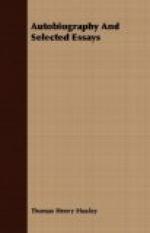If the educational time at our disposition were sufficient, there are one or two things I would add to those I have just now called the essentials; and perhaps you will be surprised to hear, though I hope you will not, that I should add, not more science, but one, or, if possible, two languages. The knowledge of some other language than one’s own is, in fact, of singular intellectual value. Many of the faults and mistakes of the ancient philosophers are traceable to the fact that they knew no language but their own, and were often led into confusing the symbol with the thought which it embodied. I think it is Locke [84] who says that one-half of the mistakes of philosophers have arisen from questions about words; and one of the safest ways of delivering yourself from the bondage of words is, to know how ideas look in words to which you are not accustomed. That is one reason for the study of language; another reason is, that it opens new fields in art and in science. Another is the practical value of such knowledge; and yet another is this, that if your languages are properly chosen, from the time of learning the additional languages you will know your own language better than ever you did. So, I say, if the time given to education permits, add Latin and German. Latin, because it is the key to nearly one-half of English and to all the Romance languages; and German, because it is the key to almost all the remainder of English, and helps you to understand a race from whom most of us have sprung, and who have a character and a literature of a fateful force in the history of the world, such as probably has been allotted to those of no other people, except the Jews, the Greeks, and ourselves. Beyond these, the essential and the eminently desirable elements of all education, let each man take up his special line—the historian devote himself to his history, the man of science to his science, the man of letters to his culture of that kind, and the artist to his special pursuit.
Bacon has prefaced some of his works with no more than this: Franciscus Bacon sic cogitavit;[85] let “sic cogitavi” be the epilogue to what I have ventured to address to you to-night.
THE METHOD OF SCIENTIFIC INVESTIGATION [86]
The method of scientific investigation is nothing but the expression of the necessary mode of working of the human mind. It is simply the mode at which all phenomena are reasoned about, rendered precise and exact. There is no more difference, but there is just the same kind of difference, between the mental operations of a man of science and those of an ordinary person, as there is between the operations and methods of a baker or of a butcher weighing out his goods in common scales, and the operations of a chemist in performing a difficult and complex analysis by means of his balance and finely graduated weights. It is not that the action of the scales in the one case, and the balance in the other, differ in the principles of their construction or manner of working; but the beam of one is set on an infinitely finer axis than the other, and of course turns by the addition of a much smaller weight.




